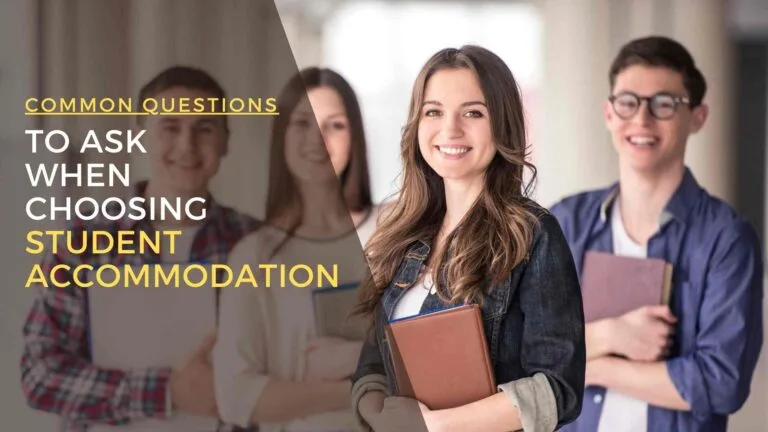Students are looking for an affordable place to stay while they study. They want to know who will pay the rent and what kind of amenities it offers, how much it costs and why it’s right for them. It’s no wonder many students struggle when choosing where to live.
Choosing a student accommodation is one of the most important decisions you’ll make in your time at university. It’s easy to get overwhelmed by all your options, but there are some questions that should be answered before making any decision whatsoever!
Here are a few questions you should ask yourself before choosing an student accommodation.
What student accommodation is best for me?
There are a variety of options available when it comes to student accommodation. You should have a clear idea of what you want before you start looking.
When considering whether shared accommodation or private accommodation is best for your needs, consider whether: You want to share with other students who live in the same building as yourself (in shared accommodation) or rooms at separate houses/apartments (in private).
If this option is important then it may be better if you choose an area where most students live together as this will help reduce costs too!
Studying in Stoke-on-Trent & need a luxuries and affordable accommodation? Cromwell Court, located 5 minutes distance to Staffordshire University can be best choice for you. Inclusive of Electric & Gas Bills and Get Free Broadband Connection.
How much rent do I need to pay?
Rent is usually paid monthly and is usually due on the first of the month. The security deposit paid at the beginning of your lease will also generally be returned to you within 3 months of signing, but this can vary depending on your circumstances with your landlord.
If you wish to pay by bank transfer or cash, it’s important that you inform them so there are no misunderstandings later on in terms of when they need their money back, otherwise, they may decide not to accept these payments until they receive proof.
In some cases, landlords may offer a discount for paying via credit card instead of cash; however this does not necessarily mean that all landlords will do so!
What are the other fixed costs?
Fixed costs are the recurring expenses that you face every month, regardless of whether your student accommodation is rented or owned by a landlord. These include:
- Bills (e.g., electricity or water)
- Internet access (if it’s not included in the rent)
- Phone calls and texting (if there isn’t free wifi available)
Fixed costs can be significant, especially if you’re living alone and have no one to help with cleaning or cooking food for yourself. In addition to these basic expenses, there may be some other additional bills associated with living in an apartment complex like laundry service charges and insurance premiums for each unit owner’s policies on their personal property within the building; these things vary depending on each individual property owner’s needs but they’re all expected out of every tenant who rents from them!
How are bills divided among flatmates?
Are you expected to pay your share of the rent or utilities, as well? If so, how much money is expected from each person in the household. Are all bills paid at once or do they go out on a monthly basis? How often are they paid and what happens if a flatmate doesn’t pay their share of the bills?
What goes into making sure that everyone has access to food? Is there an agreement about when meals will be cooked or if someone can cook their own food and eat it at home instead of going out every night for dinner with other people who live in the same building but aren’t friends (i.e., roommates).
How much deposit should I pay?
The deposit is usually a month’s rent. This means that if you pay a one-month deposit, then your landlord will hold the key to your room for two months. If you want to move out of your accommodation before this period has ended, then you must pay the remaining balance in full.
It is important to know that deposits are non-refundable by law and cannot be refunded even if there are no problems with the property; however, most landlords will accept some form of guarantee from students who wish to rent rooms/apartments at their properties as an alternative means of security against damage caused by students moving in/out etc..
Are there any other costs or hidden charges?
You may be asked to pay any other costs or hidden charges, including:
- Bills you may need to pay. You’ll have a bill every month, which includes all the things your landlord charges you for rent and utilities.
- Any fees or charges you might be liable for (such as utility bills). If there are any extra costs associated with your room that aren’t mentioned in the lease agreement, ask what they are and whether those will affect what else is included in your rent payments.
- Some landlords also require an additional payment for damage caused during a tenant’s tenancy period as well as cleaning fees if needed – so make sure this information is clear from start!
What is my security deposit used for, and how much of it can be refunded?
The majority of student accommodation providers will give you the full amount back if you move out early. However, there are some who charge a fee for doing so. In these cases, it is important to ask how much you can expect to be refunded and whether or not it has been included in your contract terms. If they tell you that they don’t give refunds and instead charge an additional amount when one leaves early, then this could be considered fraud by some financial institutions.
If something breaks down while staying in a hostel room (e.g., shower) then they may want compensation from their guests who caused this damage or loss of value due to poor maintenance standards within each establishment’s facilities throughout its premises – particularly if repairs weren’t made quickly enough after being notified about issues occurring regularly during previous visits before signing up again now because there’s no way around having everything fixed properly before moving out again next time round!
Who will be sharing the house with me?
The landlord or estate agent should provide you with a list of all tenants in your house, who they are and what their qualifications are. These details will include their names and contact details as well as any restrictions on behavior that may apply to one particular person or group. You’ll also want to find out whether people have pets (if so, consider asking if there are any breed restrictions), how many children live in the property and whether there’s a communal garden available for use by all residents.
If you’re sharing with friends or family members, it can be helpful to know how they feel about each other before moving in together, can everyone get along? What kind of personalities do they have? Are there any problems between them already? If someone doesn’t get along with another tenant at all times during the day/night cycle then it may not be worth living there anyway!
Are there any rules being a flatmate that I need to adhere to?
- Don’t be late paying rent.
- Don’t bring in pets.
- Don’t make noise after certain hours.
- Don’t smoke, or allow any other person to smoke in your home.
- Do not cause damage to the property of your flatmate (including furniture, walls and doors). If you do need to change locks on the property please get approval from your landlord first so that you can change them safely for example: if there is an old key that doesn’t fit anymore then it would be best if you got approval from us before changing over new ones!
When would I have to vacate my room in case the landlord decides not to renew the lease contract and is considering selling the property?
You should also know that if your landlord decides to sell the property, you will have to vacate it. The same goes for moving back in, renovating or moving in a relative.
You should ask your landlord when they plan on selling their house and how long they expect it would take them before they can find new tenants. If the answer is within six months, then there’s no need for concern! However if they say that finding another tenant might take up to two years or even longer (which is unlikely), then there may be something wrong with their business plan and perhaps even some bad debts related to previous renovations or other reasons behind this decision.
Last Words
You should know that the process of finding and renting a student accommodation isn’t easy. There are many factors to consider, including the cost of rent, how much deposit you need to pay and how much your bills will be divided among flatmates. Before making a decision on whether or not to sign a lease contract with your landlord, make sure that you thoroughly research the property in question and understand all associated costs before committing any money towards it.
Check: Benefits of Booking Your Student Accommodation in Advance





